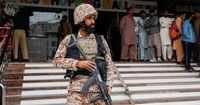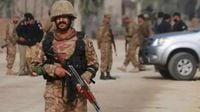In a dramatic escalation along Pakistan’s western frontier, the country’s military has announced the killing of 47 militants in a pair of operations near the Afghanistan border, underscoring the region’s deepening instability and the persistent threat posed by militant groups. The operations, which unfolded over two days from August 7 to 9, 2025, took place in the rugged Sambaza area of Balochistan’s Zhob district—a locale long synonymous with cross-border insurgency and violence.
According to the Inter-Services Public Relations (ISPR), the media wing of the Pakistani military, security forces first engaged and killed 33 militants during an infiltration attempt on the intervening night of August 7-8. A subsequent sanitization operation on the night of August 8-9 neutralized 14 additional militants in the surrounding border areas. The military reported recovering weapons, ammunition, and explosives from the slain fighters, further highlighting the scale of the threat facing the region.
“The number of terrorists killed in two days of anti-infiltration operations has risen to 47,” the ISPR stated, as quoted by multiple Pakistani media outlets. The military’s statement described the militants as “Indian-sponsored,” a charge that both the Afghan Taliban and India have repeatedly denied. The ISPR also referred to the militants as “khwarij,” a term used in Pakistan for extremist outlaws. These claims of foreign sponsorship have become a recurring theme in Islamabad’s rhetoric, especially as violence in the region has surged since the Taliban’s return to power in Kabul in 2021. India and Afghanistan, for their part, have consistently rejected these accusations, insisting that their territories are not being used for attacks on Pakistan.
The operations come amid a sharp rise in militant attacks across Balochistan and neighboring Khyber Pakhtunkhwa province. The Tehreek-e-Taliban Pakistan (TTP), the principal group targeted in these raids, has ramped up its activities since ending a ceasefire with the Pakistani government in November 2022. According to Khaama Press, clashes between Pakistani forces and the TTP have intensified since the Taliban takeover in Afghanistan, with cross-border militant activity on the rise and no sign of abating. Security experts warn that without effective cross-border cooperation between Islamabad and Kabul, the TTP threat will persist, posing significant risks to stability in the border regions.
The Sambaza area, where the latest operations occurred, is a remote and mountainous region notorious for its difficult terrain and porous border with Afghanistan. This geography has long made it a haven for militants seeking to evade Pakistani security forces. The ISPR emphasized that military operations in the area would continue “until the threat is eliminated,” signaling Islamabad’s determination to root out insurgent networks operating along the frontier.
While the Pakistani military has been quick to publicize the success of these operations, the TTP has not issued any statement or confirmation regarding the reported deaths of its fighters. The lack of independent verification is not unusual in such conflict zones, where access is limited and narratives are fiercely contested.
Balochistan’s Chief Minister, Sarfraz Bugti, was among the first to publicly praise the military’s actions. “The people of Balochistan stand united against the enemies of peace,” he declared, lauding the operation as a successful counter-infiltration move that “made the nation proud.” Bugti vowed that “every obstacle to peace and prosperity in Balochistan will be eliminated,” echoing the government’s broader commitment to restoring order in the restive province.
The recent violence is part of a broader pattern of escalating attacks in Balochistan throughout 2025. On March 11, militants hijacked the Jaffar Express in Bolan Pass, Sibi district, taking about 380 passengers hostage. In the ensuing military response—dubbed Operation Green Bolan—33 attackers, 31 victims, 21 hostages, and four security personnel were killed, while 354 hostages were rescued. The hijackers, armed with improvised explosive devices, rocket launchers, and firearms, had demanded the release of Baloch political prisoners. The aftermath saw protests erupt across the province, led by the Baloch Yakjehti Committee, demanding the identification of the dead and the release of disappeared persons.
On May 21, a suicide bomber rammed an explosives-laden vehicle into an Army Public School bus in Khuzdar, killing ten people—eight of them children—and injuring 53, including 39 children. Earlier that month, an IED attack in Mach, Kachhi district, killed seven soldiers. In July, the Balochistan Liberation Front claimed responsibility for Operation Baam, a campaign of more than 70 coordinated attacks across multiple districts, allegedly killing about 50 Army and Frontier Corps personnel and wounding dozens more. The government acknowledged the scale of the attacks but has not independently verified the casualty figures.
This escalating violence has placed immense pressure on Pakistan’s security apparatus. The military’s current campaign in Sambaza is seen as part of a wider push to stem the tide of militant activity and restore a semblance of stability to Balochistan—a province that has long struggled with insurgency, sectarian violence, and economic underdevelopment.
In recent months, Islamabad has intensified its accusations against both India and Afghanistan, alleging that they are supporting militant groups operating on Pakistani soil. These claims, however, are met with firm denials from both New Delhi and Kabul, who insist that Pakistan must look inward to address its security challenges. The competing narratives have only deepened mistrust in the region and complicated efforts to forge the cross-border cooperation that security experts say is essential for lasting peace.
Despite the military’s public assurances, many analysts remain skeptical about the sustainability of such operations in the absence of broader political and diplomatic engagement. The border between Pakistan and Afghanistan remains highly porous, and the rugged landscape of Balochistan offers militants ample cover. Without addressing the underlying grievances that fuel militancy—ranging from local political disenfranchisement to regional power struggles—the cycle of violence is likely to continue.
Pakistani officials maintain that the security forces are “committed to secure the nation’s frontiers and thwart attempts at sabotaging peace, stability and progress of Pakistan,” as stated by the ISPR. As the dust settles over Sambaza, the question remains: can military might alone bring lasting security to one of South Asia’s most volatile frontiers?
The events of August 2025 have once again thrust Balochistan into the spotlight, highlighting the enduring challenges of counterinsurgency in a region where local, national, and international interests collide. For now, the Pakistani military’s operations have delivered a tactical victory. But as history has shown, the road to lasting peace in Balochistan is fraught with peril and uncertainty.





